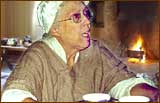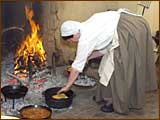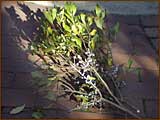WAS DEATH BY FIRE COMMON IN COLONIAL KITCHENS?
No, Says an Early American Domestic Arts Authority

By Sandy Levins ...| ...Nov. 16, 2001

CAMDEN, N.J. -- The common belief that colonial women routinely died as a result of their clothes catching fire at the kitchen hearth is a myth, Clarissa Dillon,

|
| Photo: Ellen Weymer-Carter |
Clarissa F. Dillon at the Camden County Historical Society.
| Ph.D., told a gathering at the Camden County Historical Society.
Appearing before the Historical Society's Mary Cooper Gardeners, the historian from Haverford, PA, said 18th-century women were essentially protected from fire by the very nature of the era's homespun clothing.
Ms. Dillon, a founder of Past Masters in Early American Domestic Arts, explained that colonial cooks were most often dressed in natural fabrics, namely, linen or, in colder weather, wool -- neither of which were likely to flame up after contact with embers and sparks. Instead, they would smolder, giving off a distinct smell that would alert the cook to the danger and allow ample time to pat out or smother the fire before further harm could be done.
Higher risk for modern cooks
Ironically, Ms. Dillon indicated that today's open-hearth cooks in historic buildings may face greater risks than their ancestors because most wear reproductions of colonial garb made from modern cotton -- which does burn rapidly after contact with flying sparks, embers and the open flame.
She noted a good rule of thumb for anyone cooking over an open hearth is to

|
| Photo: Hoag Levins |
Rule of thumb: take two steps back from fire before turning away from it.
| take two steps back from the fire before turning your back to it; this puts the cook far enough from the source of the fire that the swirl of her skirt as she turns is well out of harm's way.
Ms. Dillon was the speaker at a luncheon marking the first in a series of in-service programs on the practice, lore and history of 18th-century homekeeping for members of the Mary Cooper Gardeners -- a group that provides support services for the Camden County Historical Society's 18th-century mansion, Pomona Hall, including frequent open-hearth cooking demonstrations.
Past Masters
A former fifth-grade teacher who literally practices what she preaches, Ms. Dillon's Past Masters group of docent-interpreters supplements solid primary-source research from 18th-century diaries, newspaper accounts and letters with gritty, hands-on experience.
For example, Ms. Dillon has loaded and fired a musket with military re-enactors; struggled to plow a straight furrow behind a yoke of oxen at a rural Pennsylvania farm; and fashioned hot iron into horseshoes in front of a blacksmith's forge.
Her talk at CCHS was a free-wheeling program covering everything from open-hearth cooking to authentic colonial recipes and foods to 18th-century kitchen gardens vs. the colonial-revival herb gardens that have sprung up at many historical societies -- including the Society at which she appeared.
Pomona Hall mistress
The Mary Cooper Gardeners, named for a former mistress of Pomona Hall, got their start as the Society's colonial garden club in the spring of this year. But the group's interests, coupled with the needs and activities of the Society, have quickly led into other areas of service as well.
For instance, the Mary Cooper Gardeners spearheaded outdoor clean-up and landscaping efforts to improve the grounds of Pomona Hall and the adjacent Boyer Building. They continue to research and work at crafting faux foods to help bring the open-hearth kitchen to life.

|
| Photo: Hoag Levins |
Bayberry branches gathered by Mary Cooper Gardeners for this year's holiday decorations at Pomona Hall.
| At the recent Fall Festival they offered handcrafted, seasonally-decorated wreaths, handrolled beeswax candles and potpourri-scented votive candlejars for sale along with the Society's books and publications.
Candlelight and carols
They are also involved in a project that will change the way the Historical Society celebrates the holidays. This year, for the first time, visitors will be welcomed to "Candlelight and Carols at Pomona Hall," when the mansion's rooms will be festooned with traditional decorations of natural materials gathered, designed and assembled by the Mary Cooper Gardeners.
And, based in part upon Clarissa Dillon's ideas and suggestions, the garden club will get back to its roots as it researches, reinterprets and replants the Society's small garden outside the kitchen of Pomona Hall in the spring of 2002.
~ ~ ~
Sandy Levins is a trustee and Director of Programming at the Camden County Historical Society.
| 






